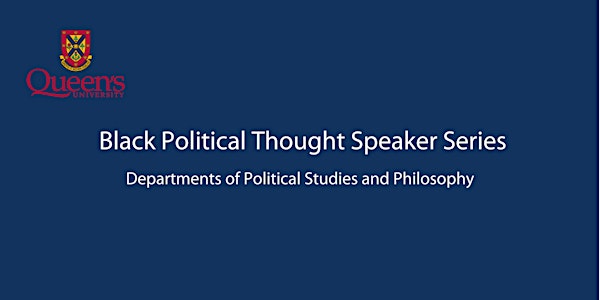
Frank Aragbonfoh Abumere - Black Political Thought Speaker Series
Black Political Thought Speaker Series - Departments of Political Studies and Philosophy
Date and time
Location
Online
About this event
"Ongoing Racism as Residual Slavery, Colonialism and Apartheid"
Frank Abumere
Friday, June 18, 2021 | 10:00 am - 12:00 pm
ABSTRACT | On 26th May, 2020 in Minneapolis, Derek Chauvin (a White Police officer) murdered George Perry Floyd Jr (a Black man). This murder is representative of the police brutality that is endemic in the United States of America (USA). It is not strange that White Police officers habitually brutalize, and premeditatedly and extra-judicially kill Black men and boys in the USA. What makes the murder of George Floyd different from the other murders is that it led to anti-racism Black Lives Matter protests all over the USA and sympathetic protests in some other parts of the world. One of the consequences of the protests in the USA and Europe is the demolition of the statues of historical figures (White men) who have been accused by the protesters of being racist by engaging in slave trade, owning slaves, engaging in crimes against humanity during colonialism such as extermination of peoples and dispossessing them of their land, promulgating or supporting racist laws, and so on. Even before the Black Lives Matter protests, the Rhodes Must Fall protests in South Africa (2015 – 2016) made similar demands. From the University of Oxford (Rhodes Must Fall), to Harvard University (Royall Must Fall) to other places, the South African protests inspired an anti-racism movement that called for decolonization. These cases remind us of prominent cases of historical injustice that are racist in nature, namely slavery, colonialism and apartheid.
As Achille Mbembe aptly observes, slavery, colonialism and apartheid have dominated and continue to dominate Black discourse. Having made the Black person to suffer separation, disappropriation and degredation, these events have subsequently ‘condensed and unified the desire of the Black person to know herself (the moment of sovereignty) and hold herself in the world (the moment of autonomy).’ Malcom X’s famous metaphor that ‘Our forefathers weren’t the Pilgrims. We did not land on Plymouth Rock; the rock was landed on us’, reflects the situation of the Black person worldwide although he was specifically referring to the historical injustice (particularly slavery, and then Jim Crow laws) against African Americans. However, some persons have argued that the legitimacy of rectificatory justice in the aforementioned events depends on circumstances. Others even go as far as to argue that in certain circumstances, such historical injustices are superseded. I think the historical injustices of slavery, colonialism and apartheid deserve rectificatory justice. Even if the circumstances of certain historical injustices in certain places make the demand for rectificatory justice illegitimate and historical injustice is superseded in those cases, I think the circumstances of slavery, colonialism and apartheid make the demand for rectificatory justice legitimate and negate the supersession of historical injustice in these cases. I base this argument on the grounds that the aforementioned ongoing racism is, in some places directly and in other places indirectly, a consequence of slavery, colonialism and apartheid. In other words, the ongoing racism is residual slavery, colonialism and apartheid. Taking a cue from W.E.B. Du Bois, my objective ‘is simply to establish the Truth, on which Right in the future may be built.’
BIOGRAPHY | Dr. Frank Aragbonfoh Abumere is a philosopher and political scientist who specializes in ethics, political philosophy/political theory and international politics. His research interests include identity politics and race relations, human rights and minority rights, social justice and global justice, African political theory and postcolonial theory, African politics and African diaspora politics, and international political theory and normative international theory. His latest work (forthcoming) is “The Basic Structure of the African State”, in African Political and Economic Philosophy, eds. Ephraim Essien et al., Oxford University Press. He is currently a visiting professor at the Centre for Studies in Ethics and Politics, Vita-Salute San Raffaele University (Milan) and Arrupe Jesuit University (Harare). Prior to visiting San Raffaele University and Arrupe Jesuit University, he was a Senior Fellow at St Anthony’s College (University of Oxford), an Academic Visitor at African Studies Centre, Oxford School of Global and Area Studies (University of Oxford) and a Visiting Research Fellow at the Department of International History, London School of Economics and Political Science (LSE). He was also the leader of the Global South research group at the Department of Philosophy, The Arctic University of Norway, and a Lecturer (Assistant Professor) at the Department of Philosophy, Ebonyi State University, Nigeria